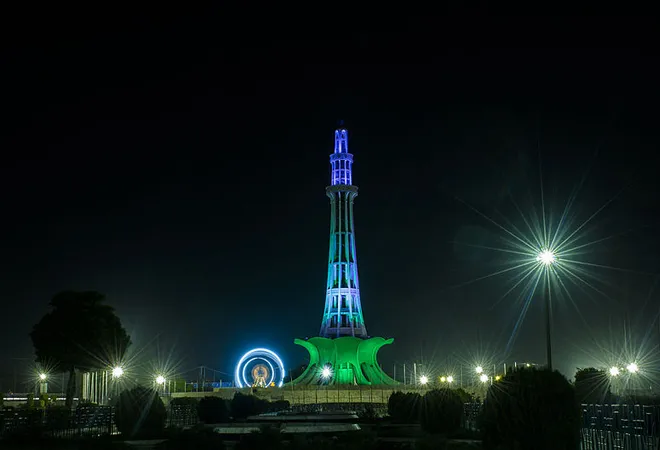As Pakistan goes to the polls, there is a sense of déjà vu, with the Deep State (the Army and the ISI with the judiciary playing a supporting role) now propping up Imran Khan as their favorite leader against Nawaz Sharif, just as it had propped up Nawaz Sharif against Benazir Bhutto in 1990. Similarly, Islamist extremist groups are being mainstreamed today just as Gen. Musharraf brought in the Muttahida Majlis- i- Amal, a coalition of ‘Islam pasand’ parties strung together by the Army, into Parliament in the elections of 2002.
It is history repeating itself as a farce with tragic consequences to the people. The Generals do not seem to learn that you cannot get different results from the same pattern of behavior. And they are unwilling to change. This is also the crux of a new book by Husain Haqqani – ‘Reimagining Pakistan: Transforming a Dysfunctional Nuclear State’. How can you reimagine a country that refuses to change, despite all its past follies?
By all indications, Pakistan’s present is scary. It’s a ‘dysfunctional nuclear state’. Its future is nightmarish as the nuclear weapons are likely to fall into the hands of Islamic extremists with whom Imran Khan is closely associated. He is called ‘Imran Taliban’ for a good reason. And how does one imagine a ‘nightmare’. What are the constituents of a ‘nightmare’? That in effect is the challenge of Haqqani’s book; to ‘reimagine’ Pakistan and transform it.
While the book is a brilliant exposition of all that’s wrong with Pakistan, it disappoints on its key promise; the ‘Reimagining’ part. Reimagining can be done in two ways. First is to take up the accepted notions and narratives and reimagine them by questioning their basic premises. This is done with emphatic assurance of a scholar who deeply understands his country and empathises with its plight. Almost every page has a fresh insight into the old narrative, analysing the accepted notions of its ‘flawed inheritance’ and its founding principles; fears and insecurity that bred jihadi terrorists either to fight the former Soviet Union, or to wage war in Kashmir; its asymmetrical relationship with India that compelled it to seek nuclear weapons rather than build schools and hospitals to produce healthy and educated youth who could build a modern state with a stable and prosperous future. And he calls this imagination as the ‘March of Folly’ in the words of Barbara Tuchman. Quoting Tuchman he explains that ‘a policy is considered a folly based on three criteria: “first, the policy adopted must have been perceived as counter-productive in its own time, not merely by hindsight; second, a feasible alternative course of action must have been available; and third, the policy in question should be that of a group, not an individual ruler, and should persist beyond one political lifetime.” Clearly, counter-productive policies seem to be the default mode of policy making in Pakistan.
Second, is the kind of imagination that ‘transforms’ reality. Like Nehru’s imagination of a new India, which must have been a daunting challenge in 1947. It is this transformative imagination that is missing. Haqqani knows the pulse of his country; fears that it is terminally ill, correctly diagnoses and describes the illness in all its varied details but fails to prescribe a panacea for its ills. Probably there is no one single remedy and even if there is one, the patient will not take it, due to addiction to past habits and the unmitigated certainty that neither America nor China will let it fail. If America has bailed out the country for the last 70 years, so may China for the next 70 years.
Haqqani looks at some of the countries that were in a far worse position than Pakistan in the mid-1940s, such as Germany and Japan that were practically born out of the ashes to attain unprecedented levels of social development and economic prosperity. Some Pakistani leaders in the initial years sought for their country a ‘Marshall Plan’ like aid, (an European Recovery Program in which the US provided over $13 billion to 17 West European countries after World War II, from April 1948 to mid-1952). This amount is roughly equivalent to $110 billion in 2016 USD terms.
As Haqqani points out, Pakistan has not done badly either in getting from the US a massive sum of $45.147 billion, between 1954 to 2017, which is certainly a bigger chunk than what any single European country received. Interestingly, Pakistan is the only country that America has given so much aid without bombing it first. But then why hasn’t Pakistan grown like any of the European countries? The fault, dear Brutus, is in their ‘imagination’ or the poverty of it.
Haqqani also raises the question as to whether Pakistan could possibly go the way of Yugoslavia and break up into its ethnic parts, with a separate Baluchistan, and a Pakthunistan that may join Afghanistan (as the former US Ambassador Robert Blackwill had suggested). If the Bengalis of East Pakistan could revolt against Punjabi domination in 1971, the Balouch could do it too and they have been fighting for their freedom ever since 1948. Will Pakistan disintegrate or will it continue as one unit?
A new lifeline thrown at Pakistan may keep it floating, perhaps for the next 70 years. Thanks to President Xi Jinping and his grand inter-continental imagination of ‘One Belt One Road’, the China-Pakistan Economic Cooperation is promising to invest more than $44 billion (almost equal to the entire sum provided by the US in 63 years) package of projects at modernizing its infrastructure and connectivity with China and rest of Asia.
The size of CPEC investments is about 16% of Pakistan’s 2016 GDP. (This is the same as our tax to GDP ratio, and one of the main reasons that Pakistan desperately needs external donors is that it hardly taxes its people). As Haqqani says ‘ironically, CPEC is seen by Pakistan not merely in economic terms but as a security guarantee of China’s commitment to their country’.
Will Pakistan survive as a viable economy now that it has been placed in the ‘Grey List’ (just a shade away from the ‘Black List’) of the anti-terror financial watchdog Financial Action Task Force for its failure to cut off funding to terrorist groups?
Perhaps China will bail it out. Pakistan will mortgage its geo-strategic location to China and live off the rent as it did with America in the past. But being a rentier-state to China may be a different ball game altogether. That poses new challenges internally to Pakistan and externally to India.
The tragedy of Haqqani’s book is that it is unlikely to be read by those who rule Pakistan. And even if they do, they are unlikely to change, for that would go against their core interests. And its next seventy years would be far more troubled and troubling for the region.
This commentary originally appeared in ET Online
The views expressed above belong to the author(s). ORF research and analyses now available on Telegram! Click here to access our curated content — blogs, longforms and interviews.




 PREV
PREV


